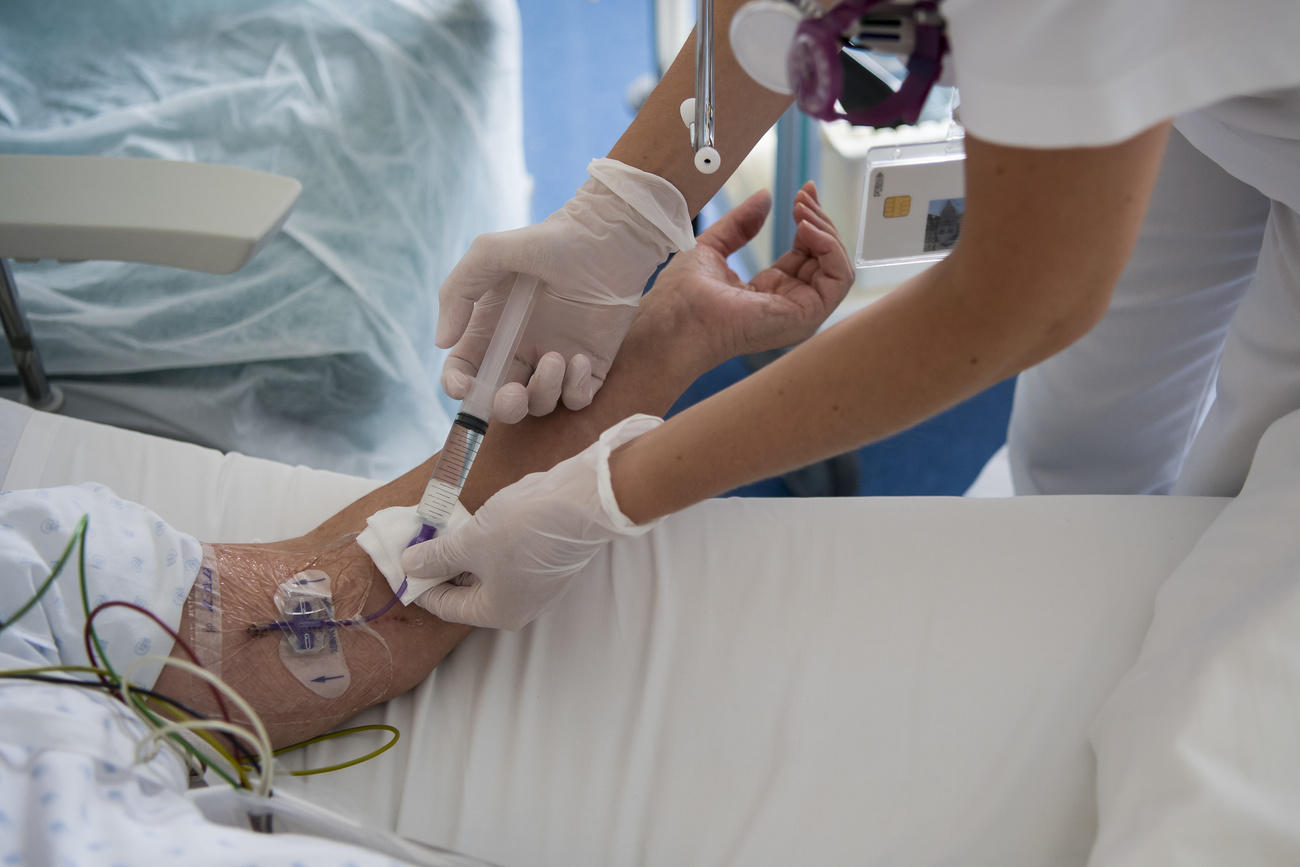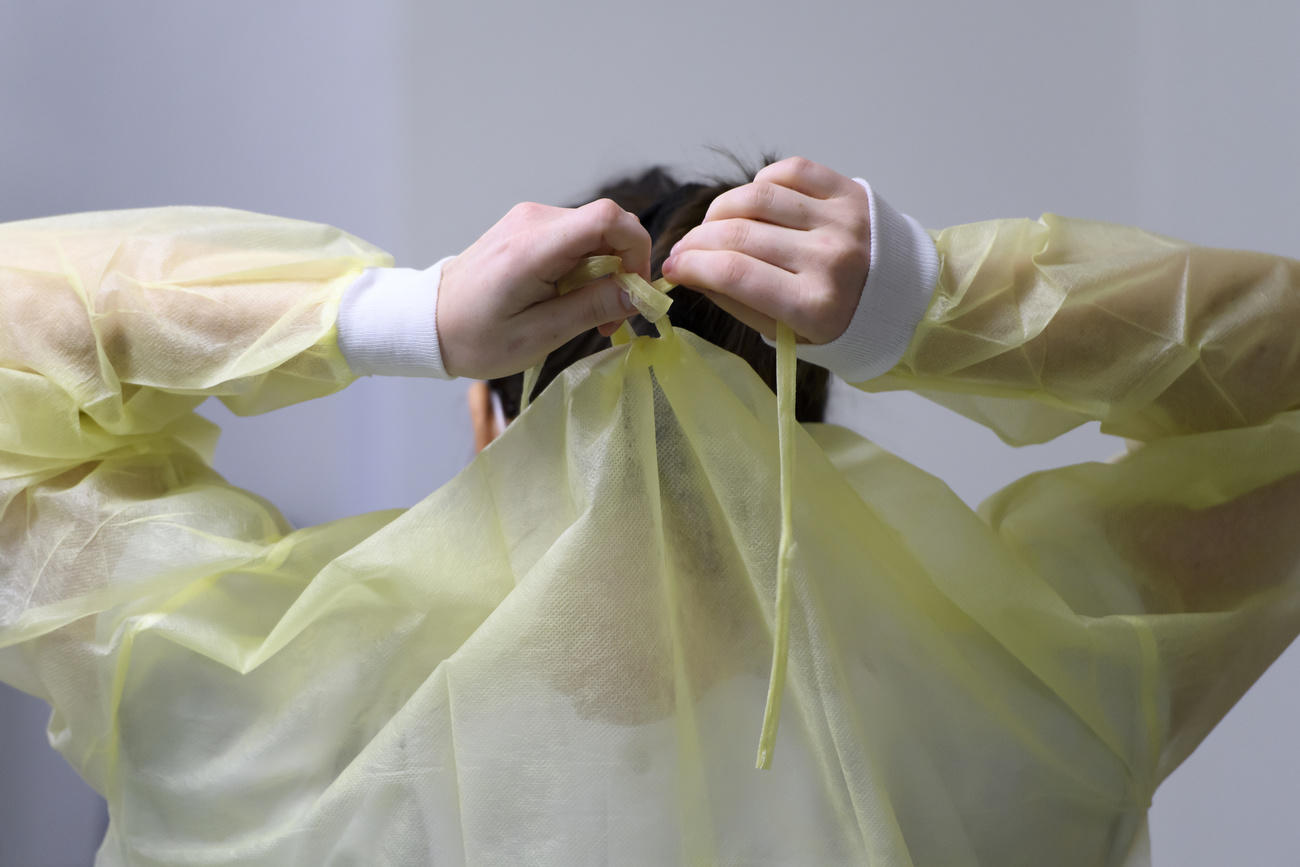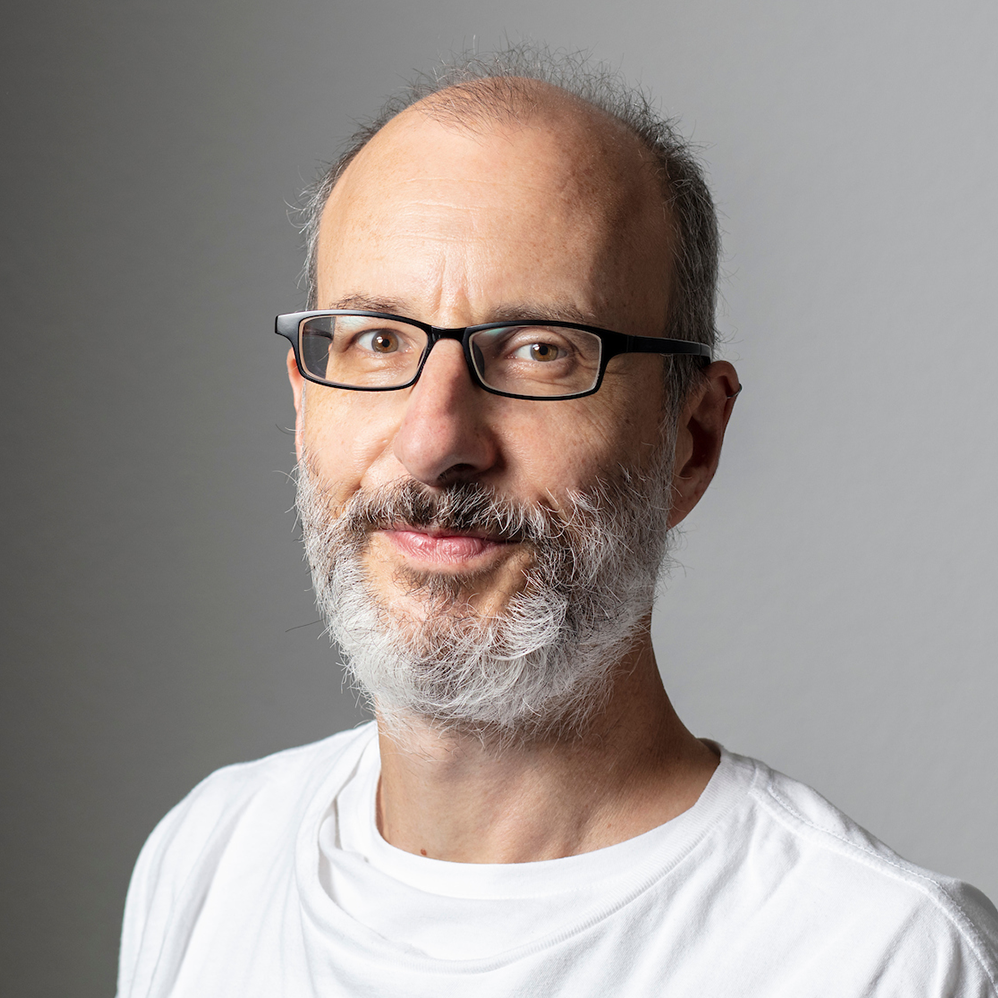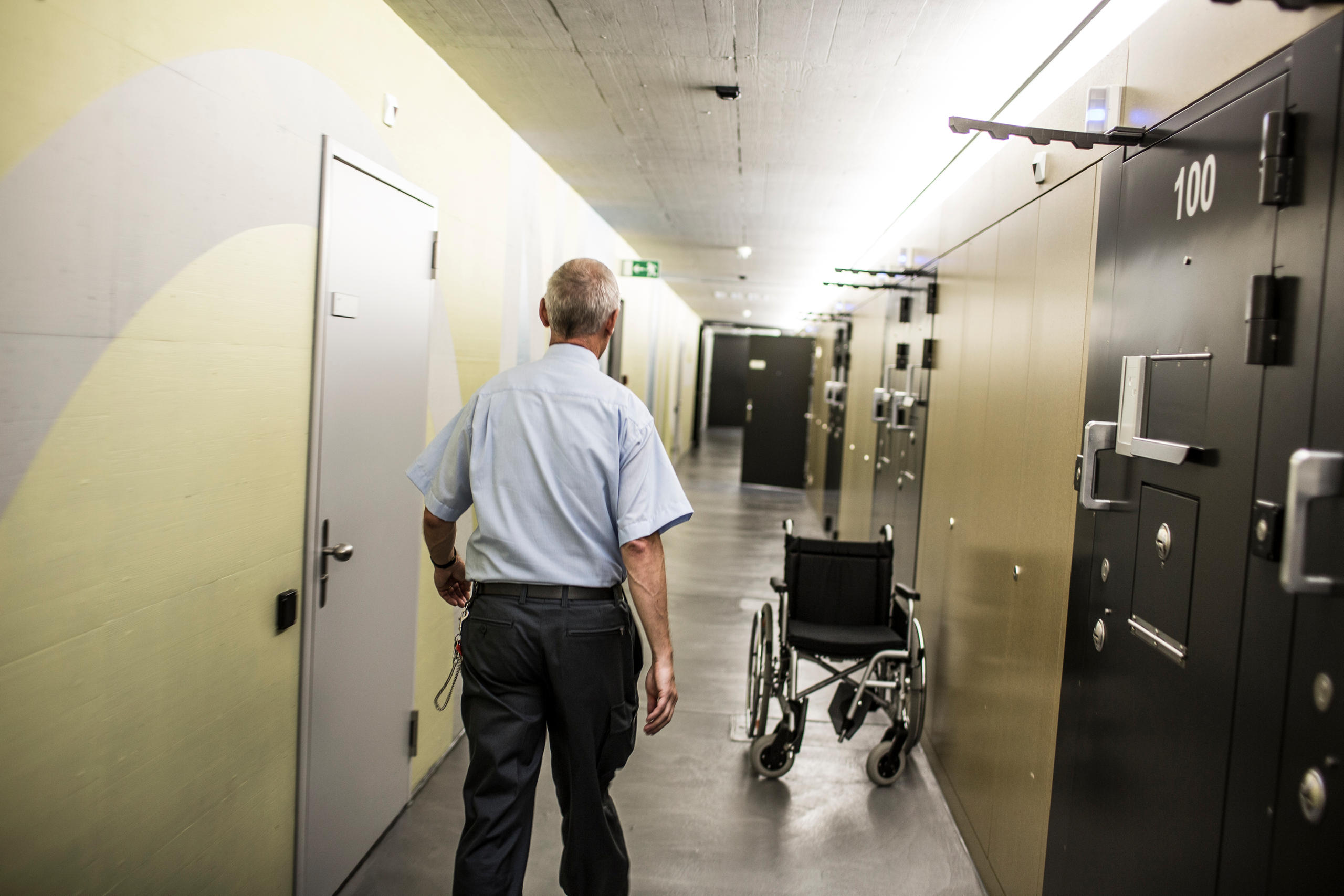Nurses in Switzerland: stressed out and underpaid

Nurses are hard at work right now dealing with the coronavirus pandemic. But even apart from difficult times like these, hospital work can be exhausting and frustrating. There are consequences for patient care. What is the real state of health of the nursing profession in Switzerland today?
The old lady died during the night. No-one had ever come to see her. It was a long hospital stay and a slow decline without any visits from family or friends. Jennifer S.* was at her bedside. “I can still hear her last breath. I did not want her to die alone.”
To mark International Nurses’Day (May 12) and the International Year of the Nurse and Midwife declared by WHO, swissinfo.ch canvassed the views of nurses in several public hospitals in Switzerland. This project was carried out several months before the coronavirus pandemic.
A year after this tragic event, the young nurse in a cantonal hospital in central Switzerland is still shaken. It was the first time she had seen someone die. But Jennifer S. (21) knows that being with patients in the last moments of their lives is part and parcel of her job. And it’s really why she became a nurse. “I wanted to do something useful for society, for people.”
This idealism already took a beating during her days as a student nurse. Jennifer S. talks about exhausting shifts, irregular working hours and continual changes of plan. The work hierarchy is authoritarian, and discontentment and disillusionment widespread among the staff, she says. Most of all, the nurse shares her frustration at having too little time to watch over the patients’ healing process. “No-one talks about the problems in hospitals. There’s a conspiracy of silence. I’d like to go demonstrate out in the streets. But then who is going to look after the patients?”, she says.

More
Overwhelming, lonely and stressful – life in the Covid-19 unit in Geneva
Sylvie F. (26) in Geneva, decided to become a nurse because of the contact with the patients. A smile or a word of thanks from a departing patient are the most gratifying things, she says. At her first job in a hospital following four years of study, she has realised, however, that the job is different from what she imagined. “If I could, I would change jobs,” she admits.
On a day shift she looks after six patients, and it’s twelve on a night shift. She also has to answer the phone, arrange admissions and discharges, fill out forms, and talk to family members about the health of their loved ones. “There are always too few of us, and absences don’t get filled in. There are cases of burnout, but they are covered up,” she says.
Melanie T., a nurse working in pediatrics and maternity, had a burnout after 14 years working in regional hospitals in canton Zurich. “It’s a terrific job,” she says. “But if you don’t have that inner motivation, you get sick.” The nurse tells about getting burned out due to mobbing by her superiors, after an absence for health reasons. “At a certain point you just can’t manage any more and you collapse, but that doesn’t interest the employer,” she says.

Unacceptable violations
Jennifer, Sylvie and Melanie are not isolated cases, says Pierre-André Wagner, manager of legal services for the Swiss Nurses’ AssociationExternal link. “In the healthcare industry there are abuses that would be unacceptable in any other sector. Labour law is constantly being flouted,” he argues.
In his office in Bern, the lawyer and qualified nurse has analysed hundreds of cases. And he has plenty of examples of abuses. “Someone who is no longer able to do night shifts for health reasons loses their job. Someone who exposes abuses becomes a victim of mobbing. Someone who opposes rationalisation that negatively impacts the quality of care is accused of lack of loyalty to the institution,” Wagner wrote in the association’s monthly magazine.

More
On the frontline at a Swiss hospital battling Covid-19
Yet to generalise all this and criticise the entire nursing sector in Switzerland – which employs 214,000 people – would not be right either, he concedes. There are many differences between one ward or hospital and the next, and there are institutions in which staff feel satisfied and supported by management. Yet by and large, frustration and disaffection with the job are widespread, Wagner says.
“Disastrous effect on quality of care”
Owing to stress, an unbalanced shift system and pay rates found to be too low, one in two health-care workers has expressed a desire to change careers before retirement age. This is the finding of a 2019 opinion survey by the trade union Unia. Every year, 2,400 nurses quit the profession.
This is an “alarming” situation caused by the growing predominance of economic considerations in the way healthcare work is organised, the union said. “In the name of profitability there is rationalisation, costs are cut, there are budget cuts, and at the same time, the disastrous effects of this on working conditions and the quality of care are studiously ignored,” says Yvonne Peist-Gaillet of Unia.

More
Dying with dignity in a Swiss care home
Gaps made obvious by coronavirus
According to Wagner, the situation deteriorated in 2012 with the introduction of the SwissDRG tariff systemExternal link. “Hospitals are under economic pressure and budgetary restrictions that they can only respond to by cutting staff costs,” he says.
Devised to keep down healthcare costs and encourage hospitals to compete, SwissDRG regulates the fees for all hospital services on the basis of a lump sum per case (previously a daily rate was charged).
The current system – which, the federal government says, has got Swiss hospitals to operate more efficiently External link– is the symptom of a healthcare policy that has jettisoned the idea of serving the public and has subjected public health to capitalist imperatives, says Wagner.
The emergency in hospitals due to the coronavirus, he points out, has just shown up “all the deleterious effects of commercialisation of public health on the health care system.”
Statements from nurses: work and stress
“Overtime is just about the norm. Breaks? They are officially 30 minutes, but I am happy if I get 10” – Sylvie F., nurse in a geriatric ward.
“I have often finished up at 23:15 and started the next day at 6:45. This is a kind of institutional violence” – Valérie Jung, (36), nurse specialising in clinical psychiatry and mental health.
“The hospital was my second home. I gave all I had for 25 years. But then things just didn’t work any more. The workload increased and the staffing went down drastically” – Françoise D., (50), out-of-work nurse.
“There’s enormous pressure to make savings. The doctors have a whopping amount of work to do as well, but at least they are well paid” – Melanie T., nurse specialising in pediatrics and maternity.
“Every day, some nurse was off sick and she wasn’t replaced. I was totally stressed at work. I came home really nervous, and took out my frustrations on my family” – Carole R., (37), nurse specialising in surgery and intensive therapies.
More investment, fewer deaths
Wagner puts it bluntly: “Patient care is being ruined by a healthcare system dominated by the desire for power and money. The patient is not the focus of things anymore.”
In Switzerland, he says, tens of thousands of patients fall victim to complications that could be avoided, just because there is a push to save on nursing costs. He also deplores the increased hiring of healthcare assistant staffExternal link, with lower skills and lower pay, rather than nurses with degrees.
There is scientific proof that cuts to nursing staff, whether in terms of qualifications or staffing numbers, mean an increase in complications and mortality rates, says Wagner.
His conclusion is corroborated by a recent study External linkby professors at Bern and Basel universities, which found that increasing the number of nurses in hospitals would mean hundreds of deaths less, apart from saving millions of francs. Inadequate monitoring of a patient can cause bed sores, treatment of which causes CHF50,000 on average, a fall or a thrombosis, Wagner points out.
Statements from nurses: helping patients
“I don’t work using a stopwatch, but when you have twelve patients to look after you don’t have much time available. The elderly patients need more than just putting the medications on the bedside table. We have to make sure they are taking the medicine” – Sylvie F., nurse in geriatric ward.
“Every relationship with a patient is unique. That’s the best part about our job: a smile from someone who never smiled before, or a patient who was at great risk and who somehow survives” – Valérie Jung (36), nurse specialising in clinical psychiatry and mental health.
“All services in the hospital are documented, but no account is taken of time spent with the patient or with a family in tears. One day a patient said he did not dare ring the bell for me because he saw I was running from one room to the other. That was a hard blow.” – Carole R. (37), nurse specialising in surgery and intensive therapies.
Nurses, midwives, laboratory assistants, assistant physicians: the whole healthcare sector is under pressure, says Wagner. Currently in Switzerland only 56% of the needed staff are being trained. In the nursing sector, the situation is even more critical and new graduates number only 43%. By 2030, 65,000 degree-level nurses will be needed, says the association, which intends to do something about the lack via a people’s initiative (details below).
Medical machismo
The problem of being short-staffed is compounded by what Wagner defines as a mixture of “machismo and power-tripping”.
The model of the patriarchal physician commanding an army of nurses no longer exists, he says. “But there is still a generation of doctors there who think they are infallible and won’t accept any suggestion or observation from nurses – the ones who are closest to the patient.” Hierarchies have to be respected, with the risk that “valuable knowledge and skill among nursing staff is not taken into account”, and patients’ health suffers.
The nurse is aware of the right decisions to make in the light of the ethical framework she has subscribed to, but she may not be able to put them into effect due to lack of time, lack of interest by superiors, or the policy of the institution, says Wagner. “This causes real inner suffering which leads to frustration and burnout.”
Statements from nurses: mobbing and the conspiracy of silence
“At school we hear about an independent nursing role, participation in decision-making and analytical thinking. This is a far cry from the reality. In the workplace we are just pawns, or robots” – Albane Widmer, 25, degree-level nurse.
“The hierarchy puts us under pressure. Doctors don’t listen to us, and this has repercussions on the patients” – Sylvie F., nurse in a geriatric ward.
“Doctors want to control everything, without respecting the role of the nurse. I have endured mobbing and psychological violence. We have a whole range of skills, but in the end we are reduced to being a pair of hands. It’s like you learned to be a restaurant chef and you spend your time heating food up in a microwave” – Valérie Jung (36), degree-level nurse specialising in clinical psychiatry and mental health.
“In the hospital there is a conspiracy of silence. No-one dares to speak up” – Jennifer S., nurse.
Harassment and violence
Another “widespread” problem that Wagner uncovers is sexual harassment. His booklet on how to behave in cases of harassment from patients has been distributed in 140,000 copies. The problem was documented by a study External linkof the federal government in 2008, which found that healthcare staff run a very high risk of sexual harassment and even physical attacks.
Statistics are not available for Switzerland. According to World Health Organization (WHOExternal link) global estimates, 8-38% of health workers suffer physical violence at least once in their career. A study carried out in Italy in 2019 by the Nursing up union found that one in ten nurses has had to deal with physical violence on the job in the past year. Four per cent were threatened with guns, and half of them experienced verbal aggression.
“Harassment goes on mainly in emergency wards, psychiatry, geriatric psychiatry, and home care. Anyone who experiences this feels really torn: there is the bad feeling they get, and then the moral dilemma because they are being harassed by people they want to heal,” notes Wagner, who until 2019 was vice-president of the Federal Commission for Women’s Issues.
Switzerland is not Germany
In spite of the concerns expressed by unions and professional bodies, the situation of nursing staff in Switzerland turns out to be not so bad in international comparison.
In opinion surveys carried out in EuropeExternal link, Switzerland is one of the countries with the highest level of satisfaction with working conditions and job satisfaction. The Alpine nation has one of the highest numbers of nurses per head of population, and on average, a nurse in a hospital here is responsible for the care of eight patients, compared to 13 in Germany.
“In France, Germany and most likely also in Italy, the picture is much worse,” admits Wagner. “This is shown by the fact that Switzerland is still a magnet for foreign nurses.” One third of nursing staff in Swiss hospitals are from abroad, especially from the neighbouring countries.
This results in a problematic situation for two reasons, he points out. “The brain-drain to Switzerland means a lack of staff elsewhere. Furthermore, with better conditions than they had in their home countries, foreign nurses in Switzerland don’t have much motivation to work for change here,” he says.
Less and less money for hospitals
The lack of staff is confirmed by the Swiss Hospitals’ Association (H+External link), which acknowledges the physical and mental burden weighing on employees 24 hours a day, seven days a week.
The causes of short staffing are various, swissinfo.ch was told in an e-mail from Dorit Djelid, head of communication for H+. “With patients aging and the multi-morbidity that goes with that trend, the shortfall in nursing care is getting worse. For years now, Switzerland has been training too few people at professional level in nursing care, and the solution has been to recruit abroad. Furthermore, the nursing profession is a very stressful one, and the attrition rate is higher than in other occupations, which just serves to aggravate the shortage,” he says.
H+ also points out, though, that between 2011 and 2018 nursing staff in hospitals and clinics increased by 14%, versus an increase in the number of hospitalisations of 7%. “To claim that we have to do more and more with fewer staff is thus mistaken in the case of most institutions. The number of nurses per patient has remained constant and in some places it has even increased. The documentation tasks have increased, though, due to computerisation in the nursing sector,” says Djelid.
The Swiss Health Observatory also emphasises that the indicators regarding staffing since 2013 have shown there is stability of employment in hospitals. However, Clémence Merçay of the Observatory admits: “We know next to nothing about how the proportion of patient contact has been evolving in comparison with administrative tasks.”
Trade unionists accuse them of putting economic considerations before the welfare of staff, while H+ retorts that hospitals have to cope with the same economic restrictions as other industries. “But unlike the private sector, hospitals are subject to a system of set fees and services which give them little room to manoeuvre given their rather meagre financial resources,” says Djelid. This is a situation that concerns all the professional categories in hospitals, not just nurses.
The two sides seem to agree on one point: the government keeps tightening hospitals’ purse strings. “The reductions in fees imposed by the federal government, and initiatives calling for reduced costs, would be an example. From the hospitals’ point of view, the resources we have are clearly insufficient to meet the needs in terms of nursing care and to boost training here in Switzerland,” says Djelid.
One nurse in three is from abroad
The nursing sector in Switzerland (nurses, nursing auxiliaries, healthcare assistants, and midwives) employs some 214,000 people; of these about 98,000 are nurses with higher education qualifications.
Eight out of ten jobs in the sector are filled by women.
46% of nursing staff work in hospitals and clinics, 36% in old-age care homes, and 18% in home-based services and treatment.
In hospitals, 34% of nursing staff do not have Swiss nationality.
Monthly pay for a degree-level nurse ranges between CHF4,500-7,500, depending on experience.
Sources: federal government statistics; Swiss Health Observatory.
Hospitals have their hands tied
For Wagner, the cure for the ailment affecting nurses can be put in a few words: make the profession more attractive.
Denouncing the more outrageous abuses and taking them to court can be of help in extreme cases. In 2001, the association and the unions won a considerable judicial battle when a court in Zurich found there was pay discrimination based on the sex of employees, and imposed an increase in monthly pay of CHF500-800 for nurses in the canton.
However, the lawyer admits, these actions tend to shift the problem elsewhere. “If the hospital is obliged to accept that time spent changing and getting to the ward is work time, it will try to save money some other way. For example, by reducing break time. The hospitals actually have their hands tied. They don’t flout labour law just for the fun of it. They just can’t afford to obey it,” he says.
Investing in training
The Nurses’ Association is thus asking the government to boost its investment in training and in the hospitals. “We need to be sure that a sufficient number of nurses are trained in Switzerland, that they then stay in the profession and that their skills are recognised and put to use,” says Roswitha Koch, head of nursing care development at the association.
WHO, in dedicating this year to nurses and midwives, has called for increased investment External linkin the healthcare sector. “It is said that a person who saves a life is a hero. A person who saves hundreds of lives is obviously a nurse,” Margaret Chan, WHO’s then director-general said in 2015. “That person is likely to be overworked, underpaid, and vastly under‐appreciated.”
If Swiss politicians don’t do enough, the association intends to carry its 2017 initiative “for stronger nursing careExternal link” to a popular vote. The resolution calls for a sufficient number of degree-level nurses in Switzerland and an upgrading of the profession, with better pay, working conditions that fit in with family responsibilities, and more professional discretion on the job for nursing staff.

However, the two chambers of parliament, along with the government, do not support the initiative. They prefer a counter-proposalExternal link that encourages more training to reduce dependence on staffing from abroad, but without any undertaking to improve working conditions or make the profession more attractive.
Voters will probably get to decide on the future of the Swiss healthcare system – reputed to be one of the world’s best – in 2021.
*Some names have been changed to protect anonymity, except where first and last name are both given.
Translated from Italian by Terence MacNamee

In compliance with the JTI standards
More: SWI swissinfo.ch certified by the Journalism Trust Initiative




You can find an overview of ongoing debates with our journalists here. Please join us!
If you want to start a conversation about a topic raised in this article or want to report factual errors, email us at english@swissinfo.ch.